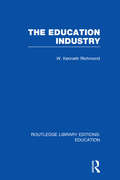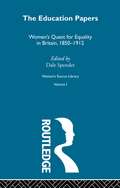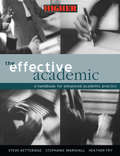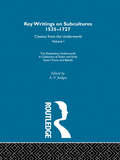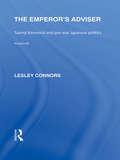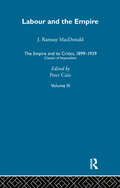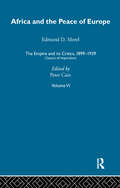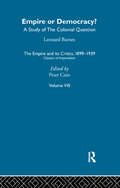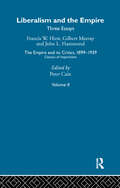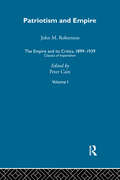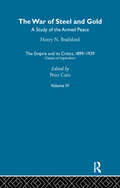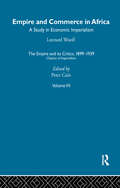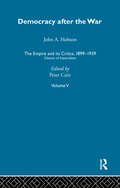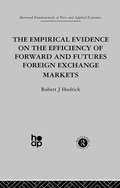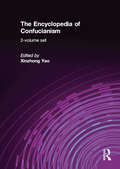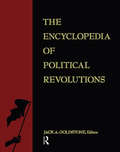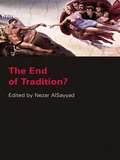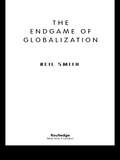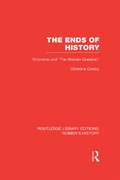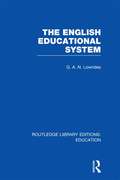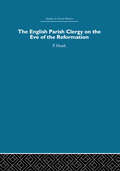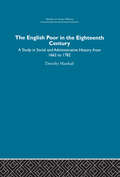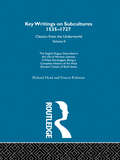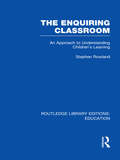- Table View
- List View
The Education Industry (Routledge Library Editions: Education)
by W Kenneth RichmondIn one sense, education was always a service industry. This book examines the quality as well as the quantity of contemporary education as it answers the following questions: Are we getting value for money? What makes a good teacher? What sort of education do we want? In the UK in the twentieth century education grew while national income did not. Britain devoted more of its resources to education than any other European nation and yet the UK had the largest proportion of children leaving school at 15 and spent more on each university place than the USA. The author argues that far too little attention was paid to cost-effectiveness analysis and planning. He examines Swedish and American examples and concludes that we must seek and employ the common features of modern management – network analysis, operational research and organizational theory. He also argues that traditional education has to come to terms with the mounting pressures of new curricula and new media.
The Education Papers (Women's Source Library #Vol. 1)
by Dale SpenderFirst published in 1987, this volume makes available key documents, giving the contemporary reader a valuble record of women's struggle for eduacation in the nineteenth and early twentieth centuries. All of the women in this collection achieved significant reforms or struggled to change popular prejudices about women's education
The Effective Academic: A Handbook for Enhanced Academic Practice
by Heather Fry Stephanie Marshall Steve KetteridgeOffers discussion, advice, expert opinion and case studies of best practice, covering the various parts of academic practice that are associated with career progression and promotion. The book is particularly aimed at education professionals aspiring to develop leadership responsibilities.
The Elizabethan Underworld - a collection of Tudor and Early Stuart Tracts and Ballads: Previously published 1930 and 1965 (Key Writings On Subcultures, 1535-1727 Ser. #Vol. 1)
by A. V. JudgesThe Elizabethan Underworld collects together sixteen of the more important tracts from the sixteenth and early seventeenth centuries dealing with the lives and misdoings of thieves, rogues, and tricksters. For the most part the original authors were men of experience - watchmen, constables and those who drifted into the London underworld and learnt its tricks. A thorough introduction contributes a full historical background and outlines contemporary social contexts.
The Emperor's Adviser: Saionji Kinmochi and Pre-War Japanese Politics (Routledge Library Editions: Japan)
by Lesley ConnorsSaionji Kinmochi was an aristocrat, a scholar and a progressive liberal politician who twice occupied the highest political office in the nation and who, during three decades, as adviser to three Emperors, coordinated and directed Japanese politics. His long life encompassed the emergence of the modern Japanese state, the establishment of the constitution, the integration of Japan into the inter-war, international community and the creation, and subsequent erosion of the democratic process. The story of his twilight years chronicles the conflicts between the goals of liberalism and internationalism which dominated Japanese politics in the 1920s and the right-wing militarism which held sway in the years leading to the Pacific War. He was a central figure in the turbulent, formative period of Japan’s political ideology.
The Empire and its Critics, 1899-1939: Classics of Imperialism
by J. Ramsay MacDonaldThe eight books reprinted in this set played an important role in defining attitudes and expectations about imperialism on the British Left in the twentieth century. They are vital in understanding the transition from the liberal anti-imperialism of the nineteenth century to the more overtly socialist critiques of the twentieth.
The Empire and its Critics, 1899-1939: Classics of Imperialism
by E. D. MorelThe eight books reprinted in this set played an important role in defining attitudes and expectations about imperialism on the British Left in the twentieth century. They are vital in understanding the transition from the liberal anti-imperialism of the nineteenth century to the more overtly socialist critiques of the twentieth.
The Empire and its Critics, 1899-1939: Classics of Imperialism
by Leonard BarnesThe eight books reprinted in this set played an important role in defining attitudes and expectations about imperialism on the British Left in the twentieth century. They are vital in understanding the transition from the liberal anti-imperialism of the nineteenth century to the more overtly socialist critiques of the twentieth.
The Empire and its Critics, 1899-1939: Classics of Imperialism
by Francis W. HirstThe eight books reprinted in this set played an important role in defining attitudes and expectations about imperialism on the British Left in the twentieth century. They are vital in understanding the transition from the liberal anti-imperialism of the nineteenth century to the more overtly socialist critiques of the twentieth.
The Empire and its Critics, 1899-1939: Classics of Imperialism
by John M. RobertsonThe eight books reprinted in this set played an important role in defining attitudes and expectations about imperialism on the British Left in the twentieth century. They are vital in understanding the transition from the liberal anti-imperialism of the nineteenth century to the more overtly socialist critiques of the twentieth.
The Empire and its Critics, 1899-1939: Classics of Imperialism
by Henry N. BrailsfordThe eight books reprinted in this set played an important role in defining attitudes and expectations about imperialism on the British Left in the twentieth century. They are vital in understanding the transition from the liberal anti-imperialism of the nineteenth century to the more overtly socialist critiques of the twentieth.
The Empire and its Critics, 1899-1939: Classics of Imperialism
by Leonard WoolfThe eight books reprinted in this set played an important role in defining attitudes and expectations about imperialism on the British Left in the twentieth century. They are vital in understanding the transition from the liberal anti-imperialism of the nineteenth century to the more overtly socialist critiques of the twentieth.
The Empire and its Critics, 1899-1939: Classics of Imperialism
by John A. HobsonThe eight books reprinted in this set played an important role in defining attitudes and expectations about imperialism on the British Left in the twentieth century. They are vital in understanding the transition from the liberal anti-imperialism of the nineteenth century to the more overtly socialist critiques of the twentieth.
The Empirical Evidence on the Efficiency of Forward and Futures Foreign Exchange Markets
by R. HodrickFirst Published in 2001. Routledge is an imprint of Taylor & Francis, an informa company.
The Encyclopaedic Dictionary in the Eighteenth Century: Architecture, Arts and Crafts (Routledge Revivals #Vol. 5)
by Terence M. RussellFirst published in 1997, this volume examines two of Sir Francis Bacon’s civil essays, Sir Henry Wotton’s The Elements of Architecture and John Harris’ Lexicon Technicum parts I and II.
The Encyclopedia of Confucianism: 2-volume set
by Xinzhong YaoThe Encyclopedia, the first of its kind, introduces Confucianism as a whole, with 1,235 entries giving full information on its history, doctrines, schools, rituals, sacred places and terminology, and on the adaptation, transformation and new thinking taking place in China and other Eastern Asian countries. An indispensable source for further study and research for students and scholars.
The Encyclopedia of Political Revolutions
by Jack A. GoldstoneThe Encyclopedia of Political Revolutions is an important reference work that describes revolutionary events that have affected and often changed the course of history. Suitable for students and interested lay readers yet authoritative enough for scholars, its 200 articles by leading scholars from around the world provide quick answers to specific questions as well as in-depth treatment of events and trends accompanying revolutions. Includes descriptions of specific revolutions, important revolutionary figures, and major revolutionary themes such as communism and socialism, ideology, and nationalism. Illustrative material consists of photographs, detailed maps, and a timeline of revolutions.
The End of Tradition?
by Nezar AlSayyadRooted in real world observations, this book questions the concept of tradition - whether contemporary globalization will prove its demise or whether there is a process of simultaneous ending and renewing. In his introduction, Nezar Alsayyad discusses the meaning of the word 'tradition' and the current debates about the 'end of tradition'. Thereafter the book is divided into three parts. The three chapters in part I explore the inextricable link between 'tradition' and 'modern', revealing the geopolitical implications of this link. Part II looks at tradition as a process of invention and here the three chapters are all concerned with the making of landscapes and landscape myths, showing how the spectacle of history can be aestheticized and naturalized. Finally, Part III shows how traditionis a regime, programmed and policed and how it has been deployed, resisted, and reworked through hegemonic struggles that seek to create both built environments and citizen-subjects.
The Endgame of Globalization
by Neil SmithFirst Published in 2005. Routledge is an imprint of Taylor & Francis, an informa company.
The Ends of History: Victorians and "the Woman Question" (Routledge Library Editions: Women's History)
by Christina CrosbyWhy were the Victorians so passionate about "History"? How did this passion relate to another Victorian obsession – the "woman question"? In a brilliant and provocative study, Christina Crosby investigates the links between the Victorians’ fascination with "history" and with the nature of "women." Discussing both key novels and non-literary texts – Daniel Deronda and Hegel’s Philosophy of History; Henry Esmond and Macaulay’s History of England; Little Dorrit, Wilkie Collins’ The Frozen Deep, and Mayhew’s survey of "labour and the poor"; Villette, Patrick Fairburn’s The Typology of Scripture and Ruskin’s Modern Painters – she argues that the construction of middle-class Victorian "man" as the universal subject of history entailed the identification of "women" as those who are before, beyond, above, or below history. Crosby’s analysis raises a crucial question for today’s feminists – how can one read historically without replicating the problem of nineteenth century "history"? The book was first published in 1991.
The English Educational System (Routledge Library Editions: Education)
by G A LowndesWritten expressly for the lay reader this volume combines statistics, achievements and failures of the educational system in England in the 20th century into a concise survey, set against the social, economic and political background of the mid 1960s. Primary, secondary and further education are all discussed, as well as special educational needs.
The English Parish Clergy on the Eve of the Reformation
by Peter HeathThis detailed study of the parish clergy in England on the Eve of the break with Rome is based on a wide variety of documentary sources, both ecclesiastical and secular, ranging from diocesan records to sworn evidence offered in litigation and acc
The English Poor in the Eighteenth Century: A Study in Social and Administrative History
by Dorothy MarshallFirst published in 2006. Routledge is an imprint of Taylor & Francis, an informa company.
The English Rogue - described in the life of Meriton Latroon a witty extravagant being a complete history of the most eminent cheats of both sexes: Previously published 1665 and 1928 (Key Writings On Subcultures, 1535-1727 Ser. #Vol. 2)
by Richard Head Francis KirkmanWhen it first appeared, The English Rogue was declared a forbidden book on account of its gross indecency. Copies were printed secretly and sold furtively at alehouses until 1665 when it was properly licensed. When requested, the author, Richard Head, declined to produce a second volume as it was his belief that the text had been interpreted as autobiographical and his reputation had suffered as a consequence. Francis Kirkman, who had acquired the rights to the work, set about the endeavour himself and wrote the remaining volumes, publishing them in 1671. This is a reprint of the 1928 reissue containing Head's original book and two of Kirkman's added volumes.
The Enquiring Classroom: An Introduction to Children's Learning (Routledge Library Editions: Education)
by Stephen RowlandThis book, by closely recording and reflecting upon the work and play of a group of 9 to 11 year-old children in a primary classroom, develops an approach to teaching and learning which is based upon the ways in which children are able to exercise a controlling influence over their own learning activity. It also suggests the sharing and analysis of classroom experience should be part of a teacher’s day-to-day life. The material for the book was gathered during a year of classroom enquiry in which the author combined the roles of teacher and researcher, working alongside the normal class teacher in a primary school. Samples of the children’s work are carefully described and analysed in an attempt to get behind the overt behaviour of the children and reveal the purposes, concerns and thinking that underlies their activity.
